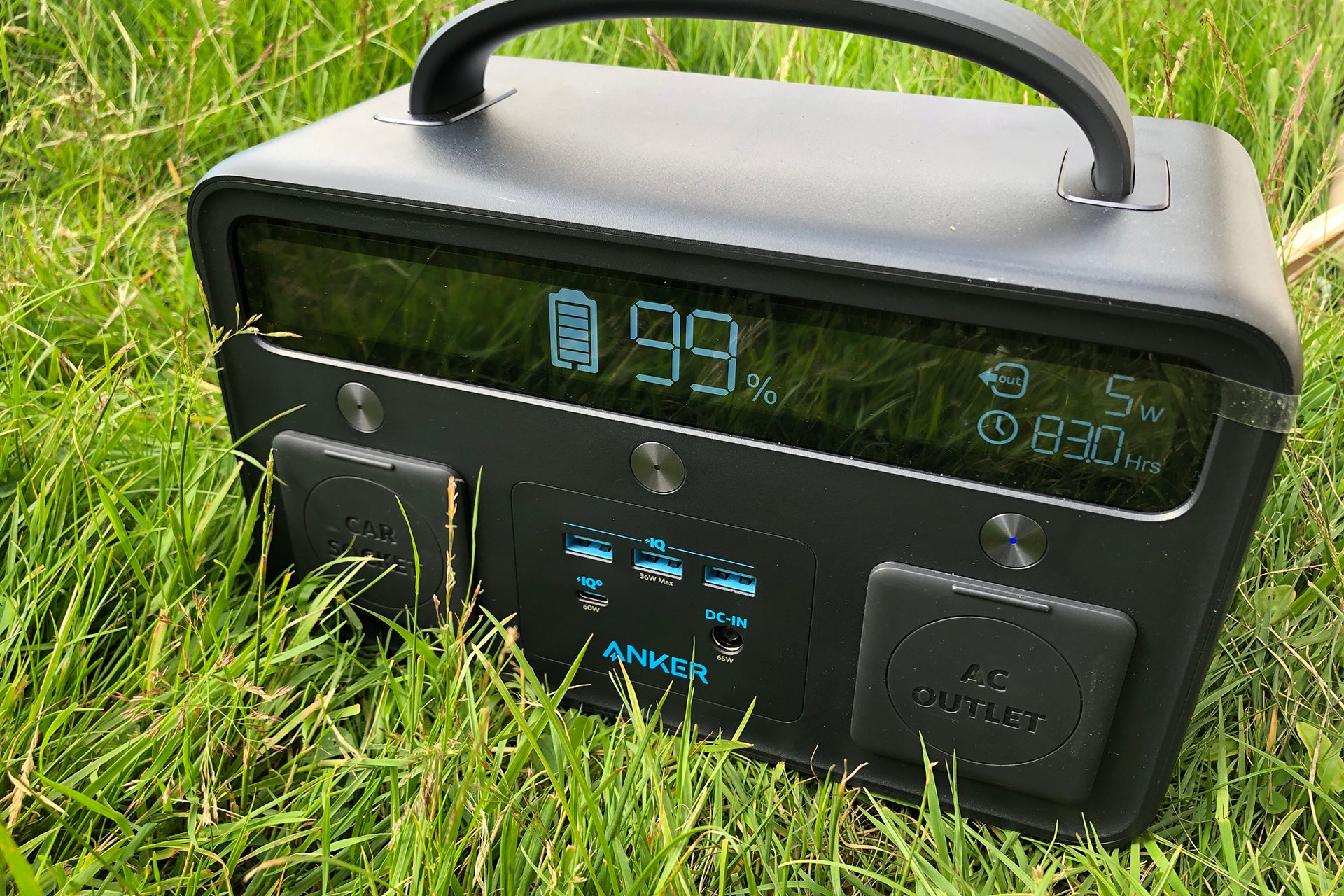Jackery Explorer 1500 Pro Review
Portable power for practically any need
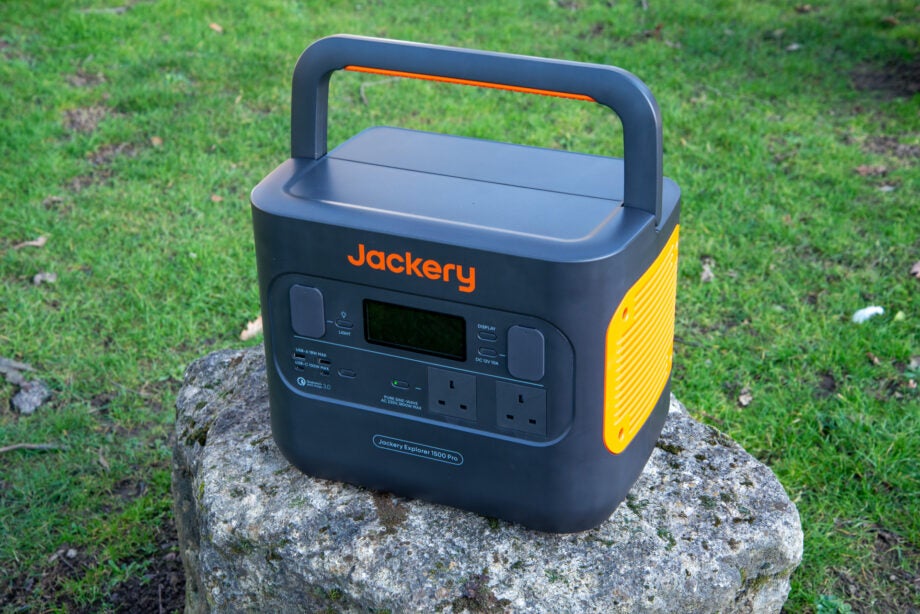

Verdict
A beast of a power station, the Jackery Explorer 1500 Pro has a huge 1512Wh capacity, making it a great choice for power hungry people that spend a lot of time off the grid. It’s simple to use with an excellent display, and is brilliantly built with a comfortable carry handle. Heavy users may prefer a system with a higher number of charge cycles, but this is otherwise a top system for taking power where it needs to go.
Pros
- Exceptionally well built
- Large capacity
- Relatively easy to carry around
Cons
- Fewer charge cycles than competition
Availability
- UKRRP: £1499
- USARRP: $1499
Key Features
- TypeA portable power station, this model is designed to power everyday appliances when you’re away from the grid.
- CapacityThis is a 1512Wh power station, which is enough power for around 1/3 of a UK home’s average daily use.
Introduction
Going camping or even living in an area with slightly unreliable power doesn’t mean the end of technology, as the growing range of large power stations demonstrates.
Solid build quality, a just-about-portable body, and a large 1512Wh capacity make the Jackery Explorer 1500 Pro a solid all-rounder.
Design and features
- Handy carry handle
- Brilliantly built
- Smart display
Packed with Lithium-ION battery packs, the Jackery Explorer 1500 Pro holds a massive 1512Wh of power, which is around 50% more than the EcoFlow Delta 2. Given that a UK home will use between 8kWh and 10kWh per day, this is a good chunk of that power.
Of course, extra capacity means more cells, which mean extra weight, and the Explorer 1500 Pro comes in at a hefty 17kg.
That’s a chunky old beast to move around, although shaped like a large cooler with a chunky flip-up handle, the Jackery Explorer 1500 Pro is actually alright to move around. Given, I wouldn’t want to take it on a long journey, but carrying it from a car to a tent or from the house to the garden is alright. In many ways, I’d say that this model is easier to carry than the EcoFlow Delta, which has handles on its edges only.
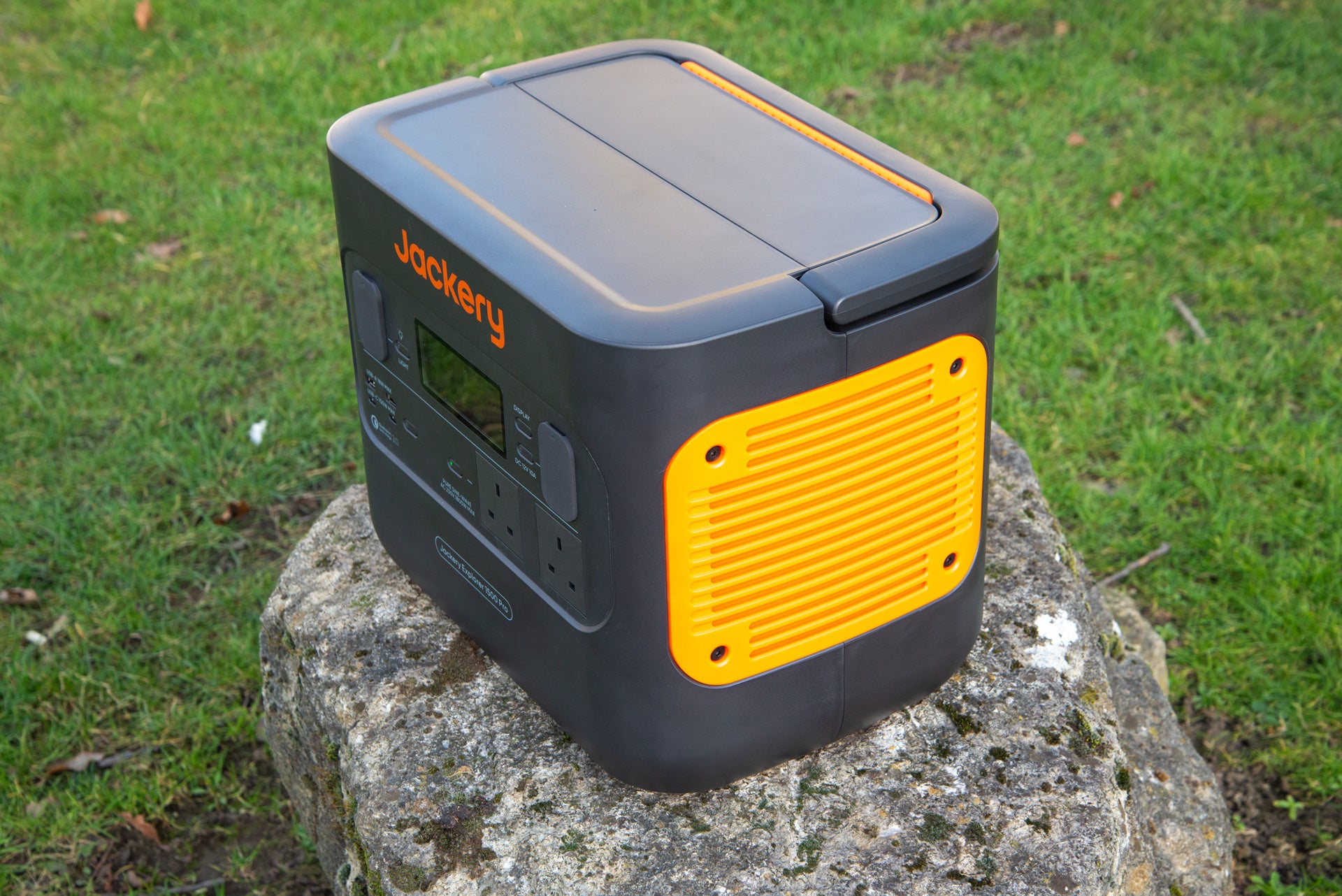
At the front are two standard UK power sockets (rated up to 1800W max, which is the vast majority of items you’d want to plug in, bar very power-hungry devices, such as kettles). There are also two USB outputs (18W Max) and two USB-C ports (100W Max), which will handle a pair of laptops.
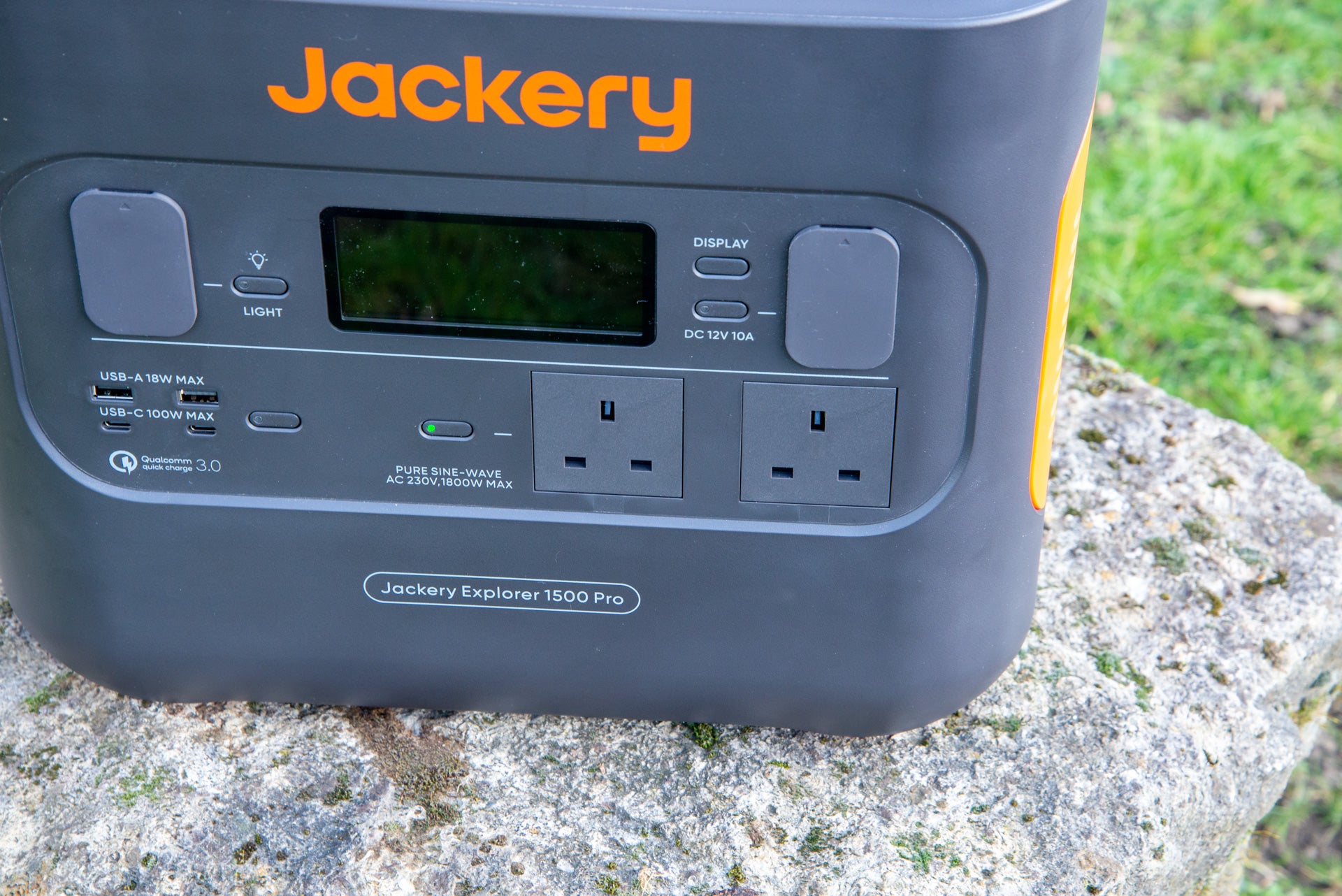
If you’ve got devices that run off a 12V car outlet, there’s a DC output running at 10A, which will handle the likes of portable fridges.
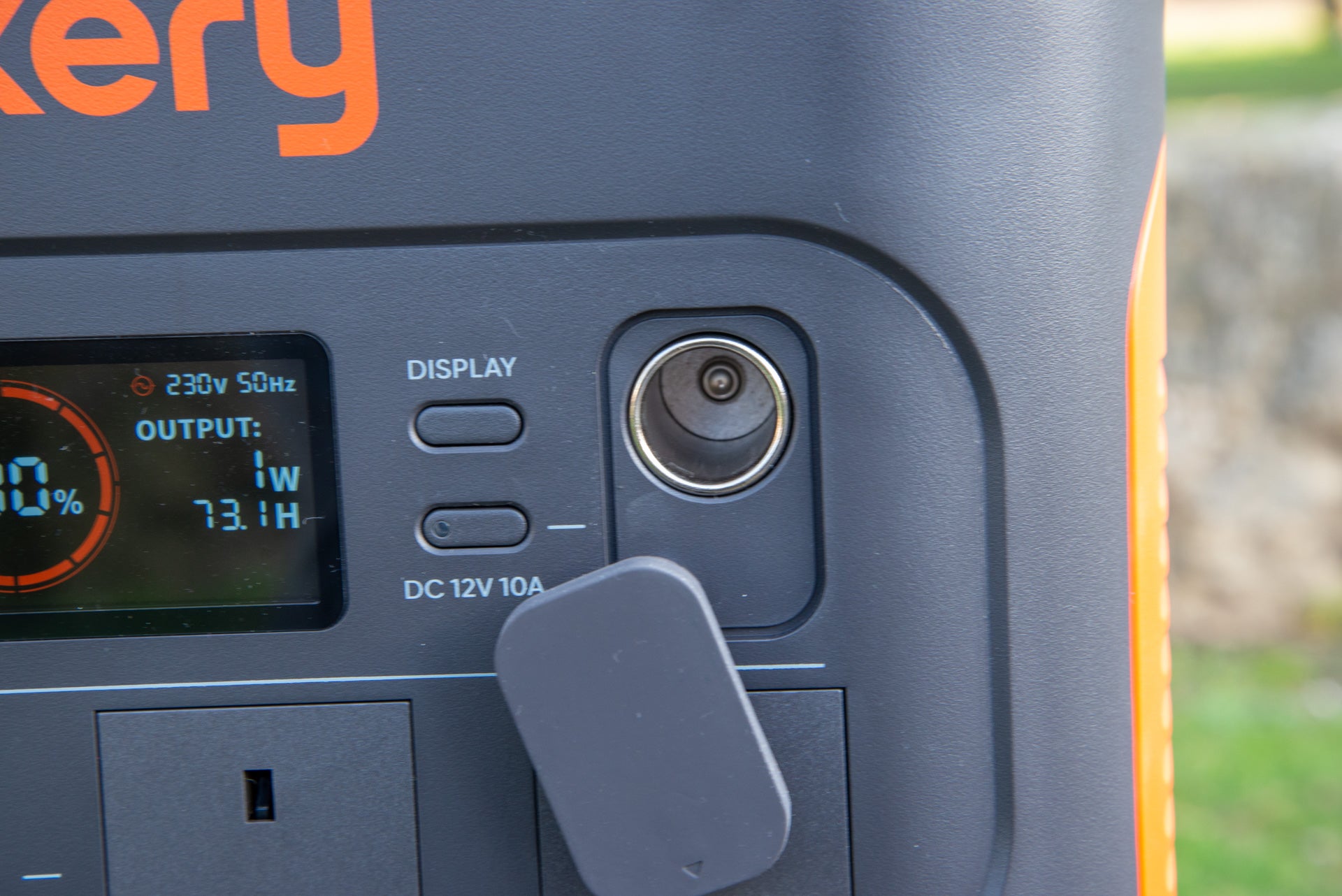
The front also has a light, which is useful for highlighting what you’re doing in front of the power station.
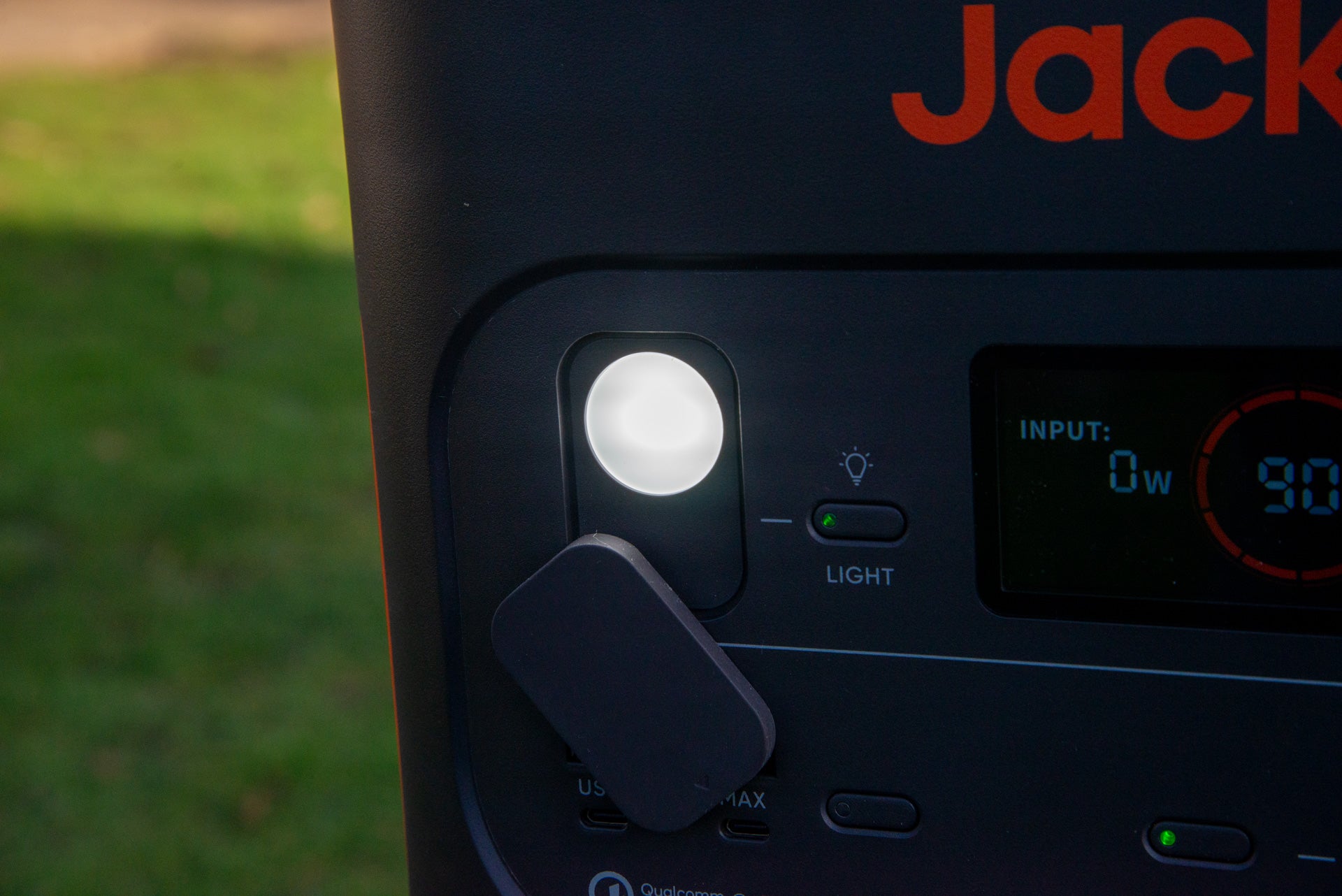
At the rear are the inputs: a standard kettle input for charging, plus a solar input for the optional solar panels.
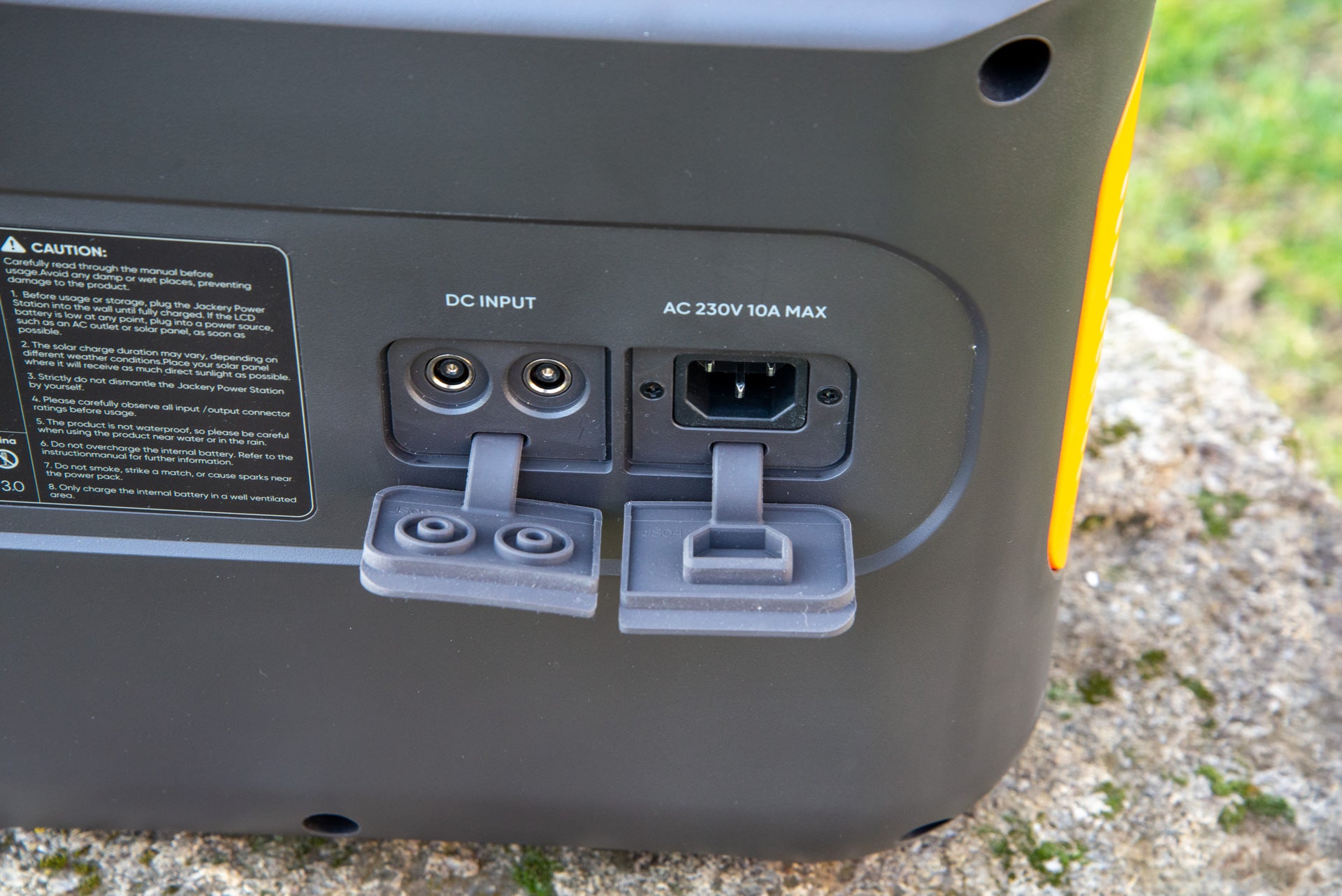
Where ports have rubber covers, I found them better made than the slightly flimsy covers on the EcoFlow Delta 2.
There’s a smart display on this device. It shows the current battery charge as a percentage, the total output (in W) and how long the battery will last under this load, plus the input power (in W) and the time it will take to charge.
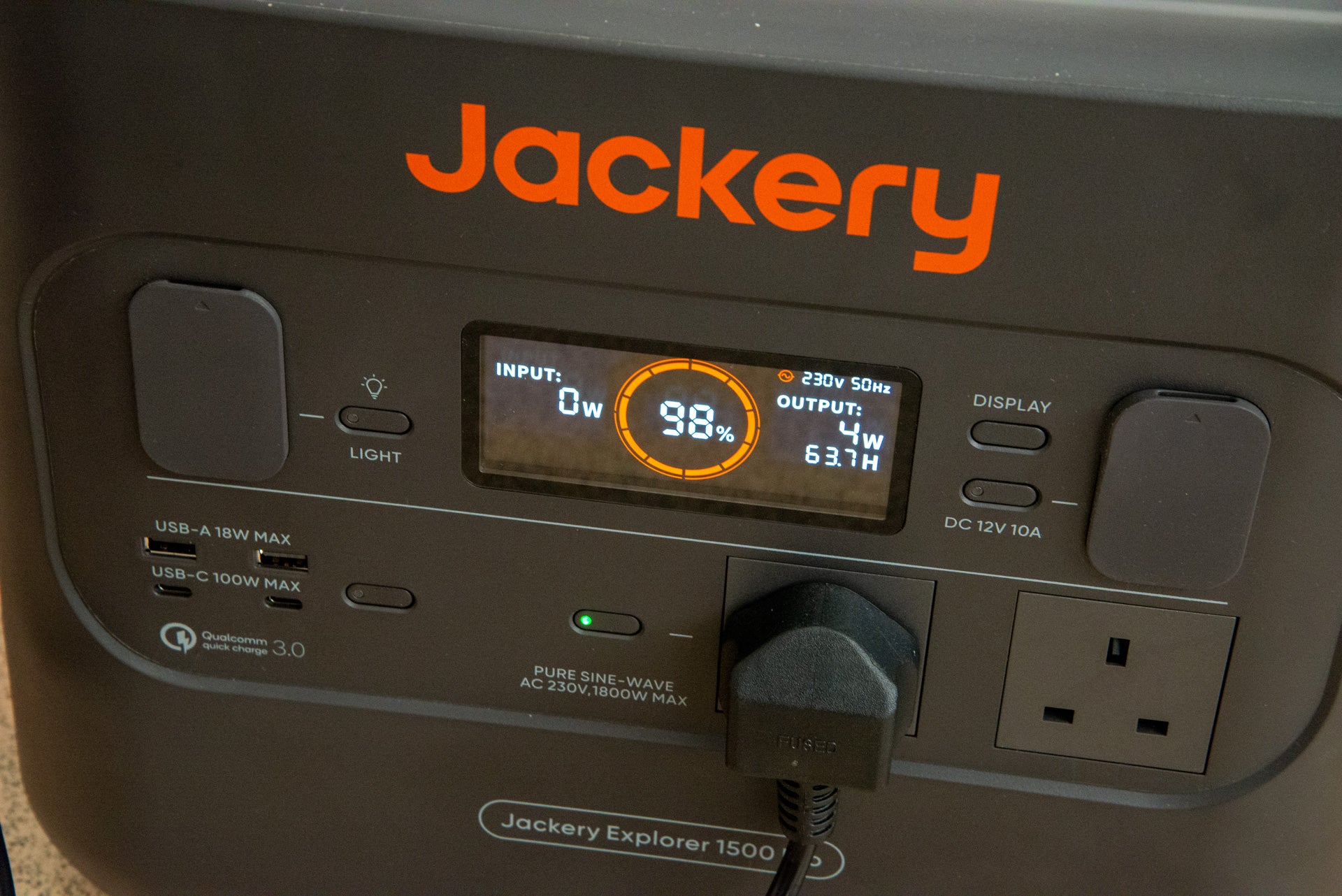
Solar charging
- Up to 1800W of power
- Results vary massively by sun power
- Well made panels
Although the Jackery Explorer 1500 Pro can be charged via the mains, solar power is an alternative if you’re going to be off grid. Jackery sells 200W panels for £629 each, and you can daisy chain six of them to get 1800W of input power.
Once again, the build quality of the folding panels is brilliant. They fold up easily and quickly into a neat carry case that makes them easy to transport.
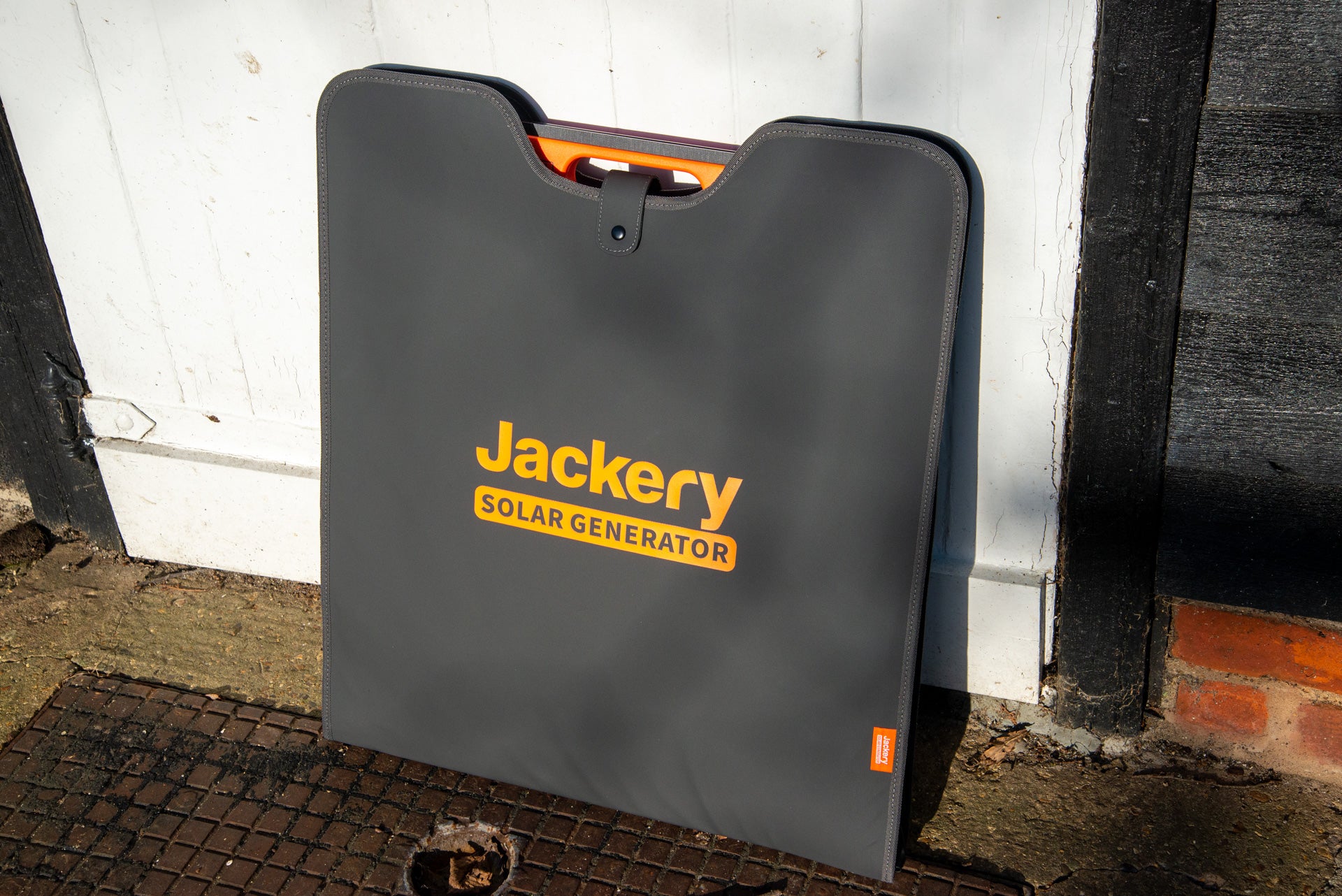
The panels have tough built-in kickstands that angle the panels at exactly the right angle, I found the 200W solar panel easier to setup than the equivalent EcoFlow model.
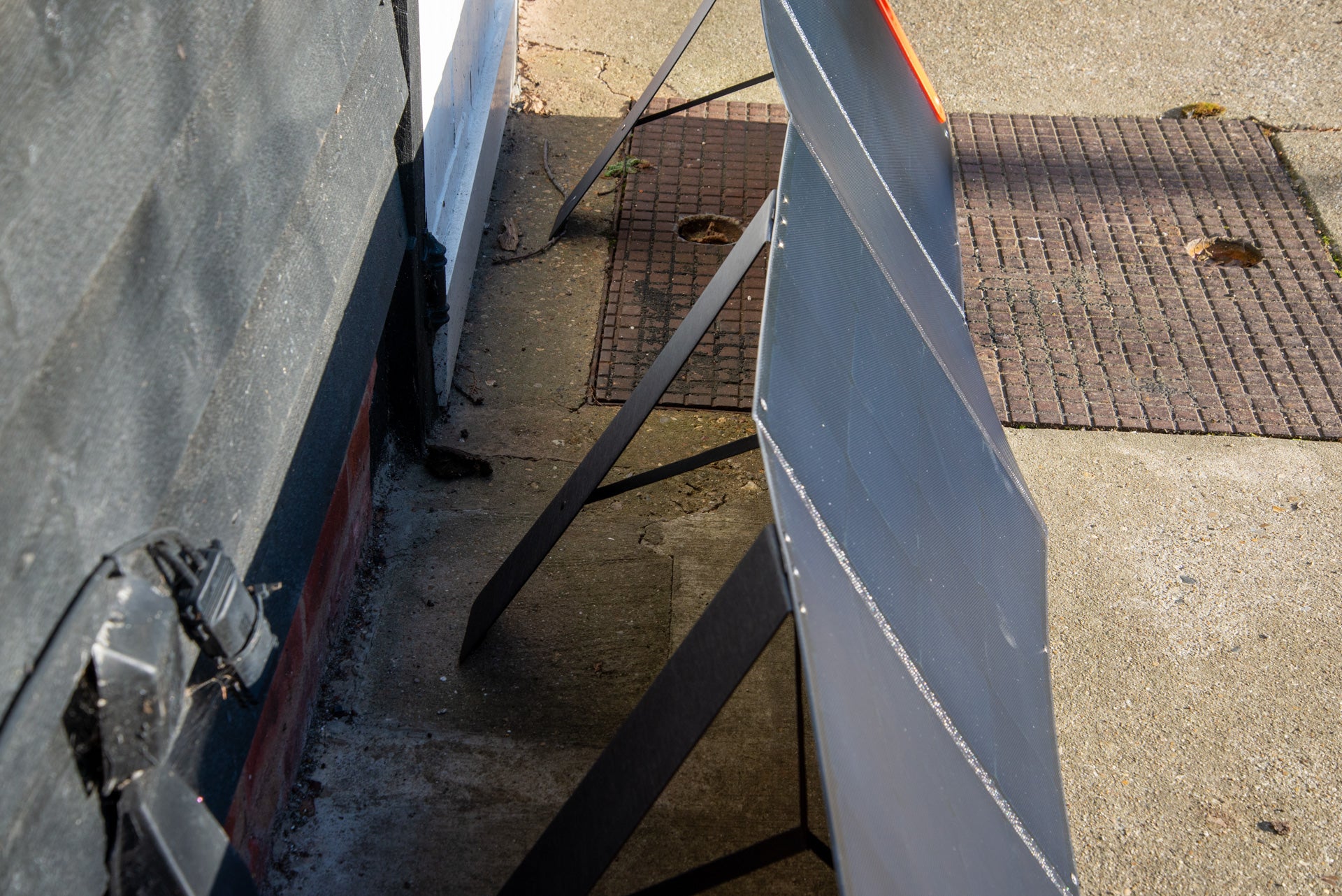
Input power varies massively by the time of year, available sunlight and time of day. On a fairly cold day, in the afternoon, I’d get around 90W of input power, which would take over a day to charge; get the full power of the sun, and power input jumped to a healthy 200W, which would get the battery charged in around nine to 10 hours.
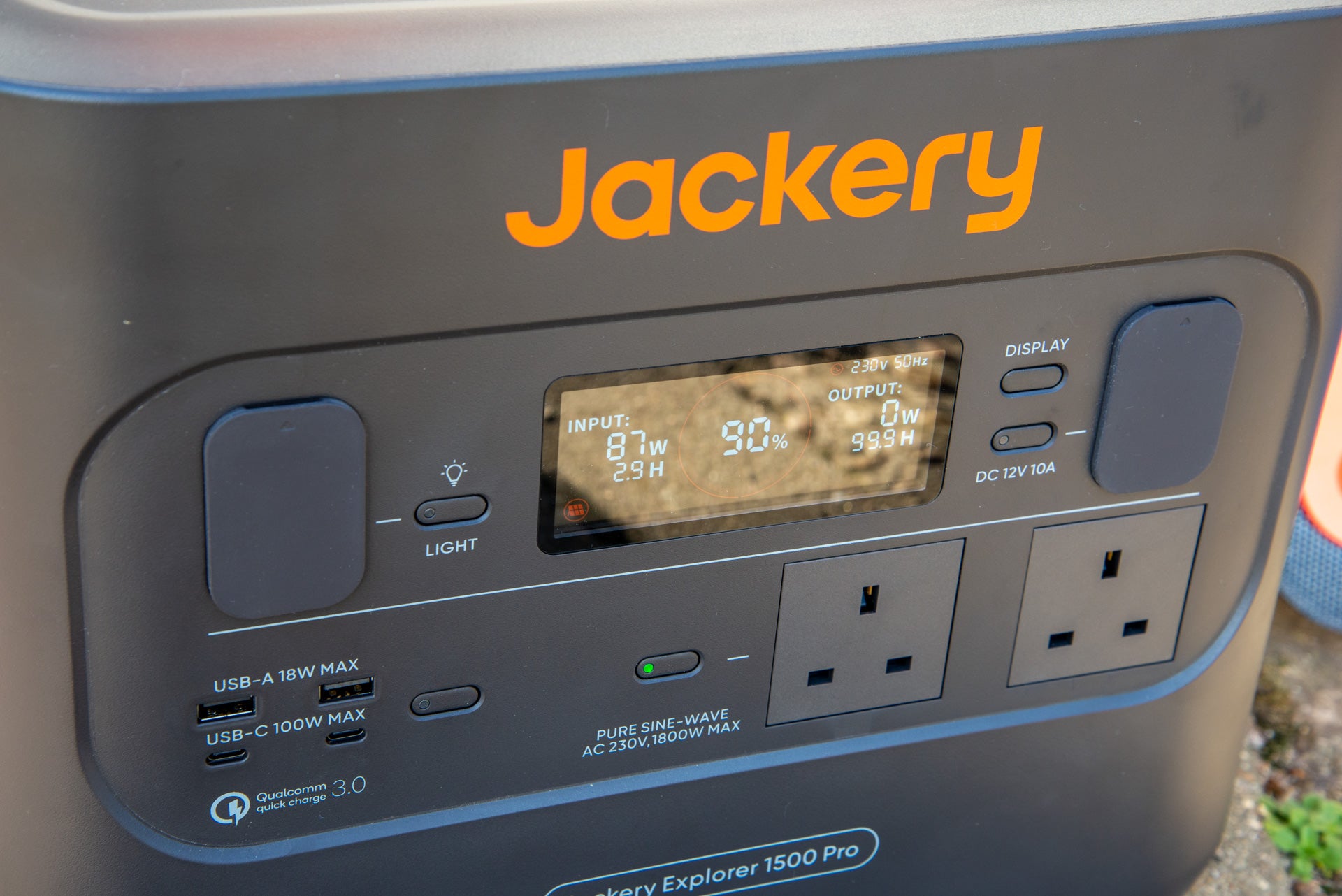
However, on an overcast day, the power input dropped to just 30W, where a full charge would take days to achieve. So, are the solar panels worth it? Well, it depends where and when you’ll use them. If you’re camping primarily through the warmer months (or travelliing to places with more sunshine than these damp isles), then quite probably; if you want all year-round power, the high cost and potentially slow charge times mean that they’re quite possibly not worth it.
Performance
- Up to 1800W output
- Long-lasting power
Although the EcoFlow Delta 2 has a maximum supported output of 2400W, the 1800W on offer by the Jackery Explorer 1500 Pro is enough for most appliances. I ran an electric heater (at its ~1800W setting), which worked perfectly, although the short run time of under an hour probably isn’t enough to keep anywhere warm for long.
That said, the De’Longhi Capsule Desk heater uses just 350W, so the Jackery Explorer 1500 could power this for over four hours.
Rather, the 1800W limit shows a useful capacity for running multiple devices, whether you want to plug in a traditional, brighter, lamp, or connect up a projector. For most typical uses, there’s a load of power here: running a portable projector, for example, the Jackery Explorer 1500 Pro could last for six hours.
That’s good news if you want to watch an epic film, such as the extended cut of one of the Lord of the Rings films, while you’re out and about.
To get a rough idea of the value of this power station, we have to look at the rated number of charge cycles until the battery capacity is reduced to 80% of their initial rating of 1512Wh.
According to Jackery, the Explorer 1500 supports 1000 cycles before 80%, which is a third of the EcoFlow Delta’s. Over the Explorer 1500’s 1000 cycles, it will have held around 1512kWh of power. At the Explorer’s current price of £1499, that works out to 99p per kWh stored, which is roughly three times the price of the EcoFlow Delta.
Add in the cost to put electricity in, at 34p per kWh, and the total rises to £1.33 per kWh of power.
It’s a slight simplification of things, as the Jackery Explorer 1500 Pro will continue to run after 1000 cycles, only its capacity will continue to diminish. What my figures do is a like-for-like comparison between devices.
Add in the solar panels, and the 1000 cycles would effectively cost an additional 42p per kWh of power. Of course, the solar panels will continue to work past that point, but the aim of these calculations is to show like-for-like costs. It also demonstrates that solar panels only become cost effective, compared to taking power from a power socket, over a long period of time.
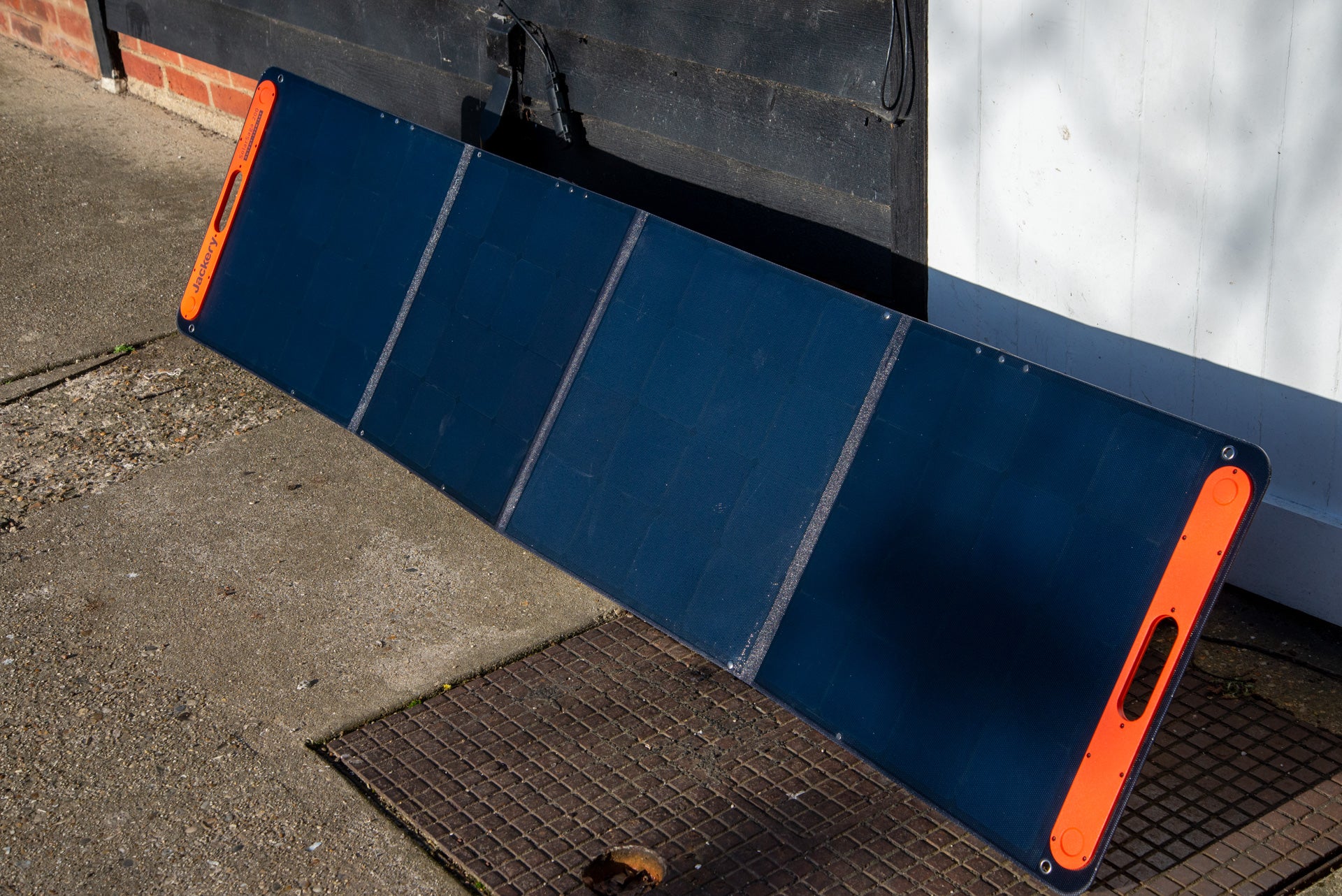
Overall, the Jackery Explorer 1500 Pro is about average for a power station, but there are longer-life models available.
Latest deals
Should you buy it?
You want a lot of power on the move: The large battery, excellent build quality and carry handle make this a great outdoor companion.
You’re a heavy user: A power station that can handle more charge cycles or that can be upgraded, might be a better choice.
Final Thoughts
Whether or not the Jackery Explorer 1500 Pro is right for you, depends on your intended use. If you’re a heavy user, then the EcoFlow Delta 2 works out at better value, as its batteries will last for more charge cycles. It’s also an expandable system, so you can add more capacity to the mix.
That said, the Jackery Explorer 1500 Pro is better built than the Delta 2, and it has more capacity in a single device that’s easier to move because of its large handle. If you’re more of an occasional user, then the better build quality and bigger starting capacity make this a great choice.
How We Test
We test every power station we review thoroughly over an extended period of time. We use standard tests to compare features properly. We’ll always tell you what we find. We never, ever, accept money to review a product.
Find out more about how we test in our ethics policy.
We test with a variety of devices to see how long the battery will last.
We test different charging methods to see how quickly the battery can be topped up.
FAQs
It has 1512Wh battery, which is about one third of the average UK home’s daily usage.
This model can support devices up to 1800W, which is the majority of appliances and devices in the UK.


